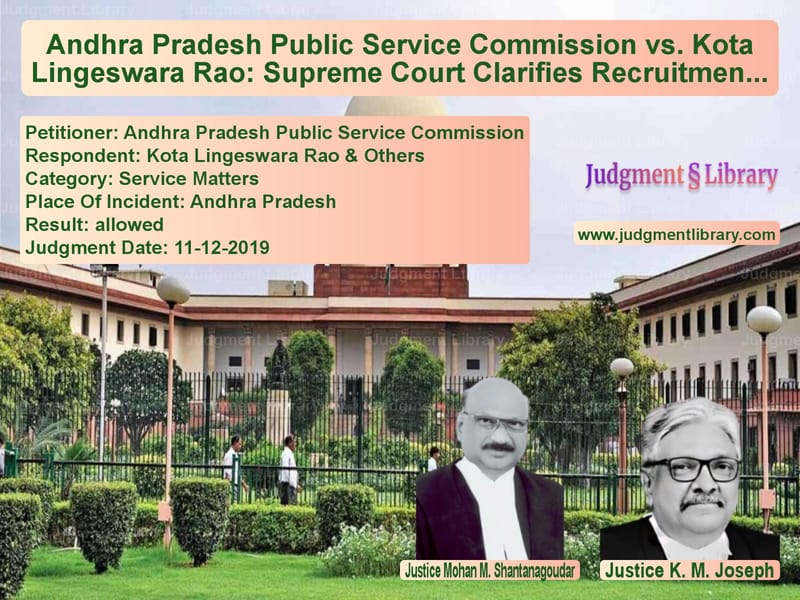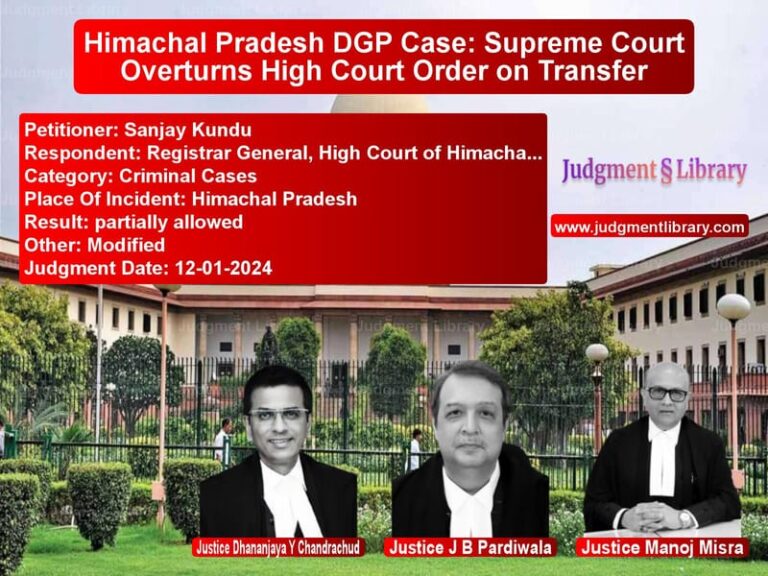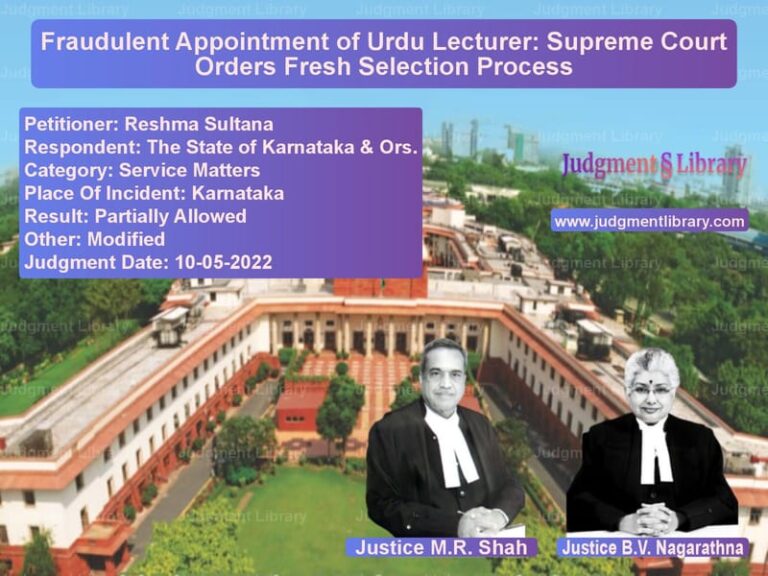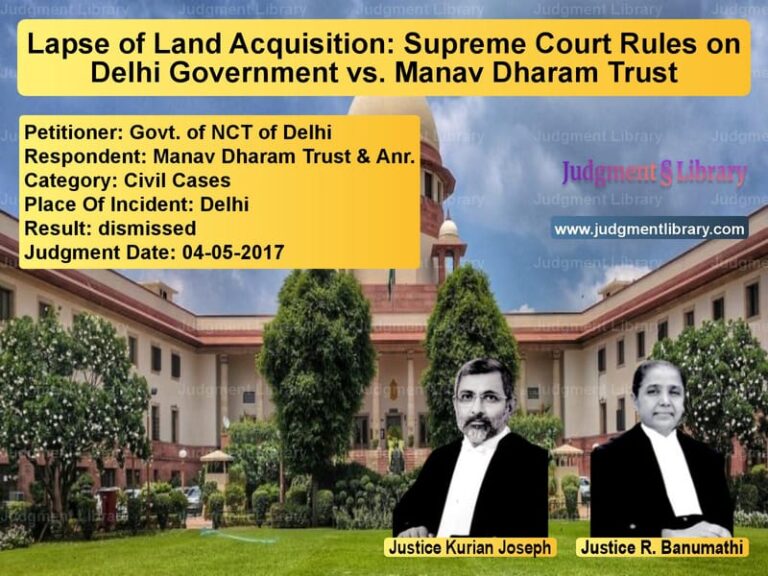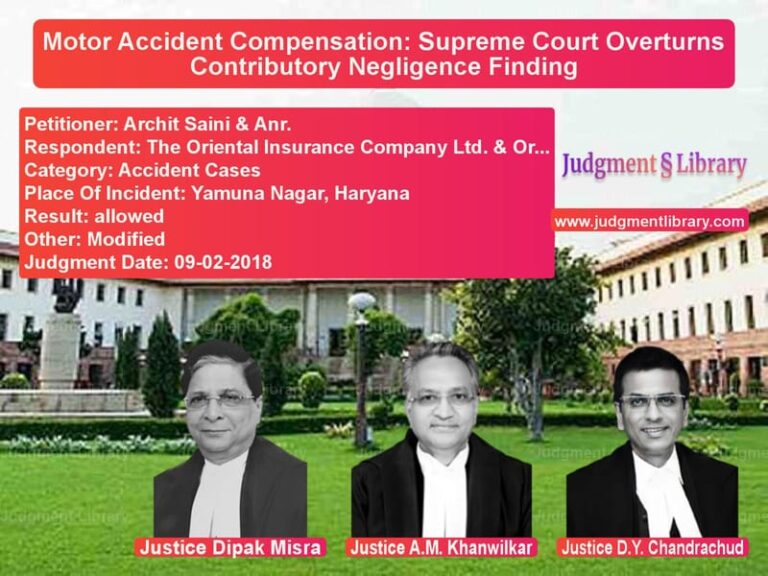Andhra Pradesh Public Service Commission vs. Kota Lingeswara Rao: Supreme Court Clarifies Recruitment Rules
The case of Andhra Pradesh Public Service Commission vs. Kota Lingeswara Rao & Others revolved around a dispute regarding the interpretation of the Andhra Pradesh Public Service Commission (APPSC) Rules of Procedure. The Supreme Court had to determine whether a candidate who was next in the merit list could claim appointment after a selected candidate failed to join the post.
Background of the Case
The Andhra Pradesh Public Service Commission (APPSC) conducted a recruitment process for the post of Junior Lecturer in Mathematics. The results were published on 03.12.2011. Respondent No. 1, Kota Lingeswara Rao, belonged to the Open Category (OC) and had secured 380.50 marks. However, the last selected candidate in the OC category, G.V. Ramakrishna Sagar, had secured 393.00 marks and was declared selected.
Despite being on the merit list, Respondent No. 1 was not selected as he had a lower score than the cut-off. The selection was finalized and sent to the Unit Officers on 04.09.2012. However, the last selected candidate, Mr. Ramakrishna Sagar, did not join the post.
After waiting for four years, Respondent No. 1 approached the Andhra Pradesh Administrative Tribunal on 02.08.2016, claiming that he should be appointed to the vacancy created due to the non-joining of the selected candidate. The Tribunal dismissed the application on the ground of delay and laches.
Aggrieved by the decision, Respondent No. 1 approached the High Court by filing a writ petition. The High Court ruled in his favor, directing the APPSC to appoint him to the vacant post.
Legal Issues Before the Supreme Court
- Whether the APPSC was obligated to appoint the next candidate in line when a selected candidate failed to join.
- Whether the interpretation of Rule 6 (amended) and Rule 7 of the APPSC Rules justified such an appointment.
- Whether the High Court was correct in ordering the appointment despite the delay.
Arguments by the Appellant (APPSC)
- The recruitment process must follow the amended Rule 6 of the APPSC Rules, which does not allow for waiting lists beyond the notified vacancies.
- Since the last selected candidate did not join, the vacancy should be carried forward to the next recruitment cycle, as per Rule 6.
- The writ petition was filed after an unreasonable delay of four years.
Arguments by the Respondent (Kota Lingeswara Rao)
- Since he was next in the merit list, he had a legitimate expectation of being appointed if a vacancy arose.
- The selection process should not be restarted when a vacancy already existed.
- The High Court correctly interpreted the rules in favor of filling the vacancy without waiting for the next recruitment.
Supreme Court’s Judgment
The Supreme Court ruled in favor of the APPSC, setting aside the High Court’s decision.
The Court analyzed the relevant rules:
- Unamended Rule 6: Stated that the ranking list would remain valid for one year, allowing replacements for candidates who relinquished their selection.
- Amended Rule 6: Removed the provision for waiting lists, specifying that vacancies due to non-joining must be notified in the next recruitment.
- Rule 7: Allowed a relinquishing candidate’s name to be removed and a replacement to be selected as per the rules in force.
The Court observed:
“The amendment to Rule 6 makes it clear that vacancies arising due to non-joining must be carried forward to the next recruitment. The system of waiting lists and direct replacements no longer exists under the new framework.”
Additionally, the Court found that Rule 7 was deleted in 2016 to avoid confusion in the selection process. The Court emphasized:
“Since Rule 6 was amended long before the recruitment process began, Respondent No. 1 cannot claim a right based on the previous rules. The High Court erred in disregarding the amended rule.”
Final Decision
- The Supreme Court allowed the appeal, overturning the High Court’s order.
- Respondent No. 1 was not entitled to appointment based on the amended Rule 6.
- The vacant post must be notified in the next recruitment cycle.
Key Takeaways from the Judgment
- The APPSC cannot appoint candidates from an expired merit list when a selected candidate fails to join.
- Recruitment must strictly adhere to the rules in force at the time of selection.
- Vacancies due to non-joining must be filled in subsequent recruitment cycles.
- The ruling ensures clarity and consistency in government job recruitments.
This judgment reinforces the importance of following recruitment rules strictly and clarifies that a candidate’s claim to a vacancy must be supported by existing legal provisions.
Petitioner Name: Andhra Pradesh Public Service Commission.Respondent Name: Kota Lingeswara Rao & Others.Judgment By: Justice Mohan M. Shantanagoudar, Justice K. M. Joseph.Place Of Incident: Andhra Pradesh.Judgment Date: 11-12-2019.
Don’t miss out on the full details! Download the complete judgment in PDF format below and gain valuable insights instantly!
Download Judgment: Andhra Pradesh Publi vs Kota Lingeswara Rao Supreme Court of India Judgment Dated 11-12-2019.pdf
Direct Downlaod Judgment: Direct downlaod this Judgment
See all petitions in Recruitment Policies
See all petitions in Public Sector Employees
See all petitions in Employment Disputes
See all petitions in Promotion Cases
See all petitions in Termination Cases
See all petitions in Judgment by Mohan M. Shantanagoudar
See all petitions in Judgment by K.M. Joseph
See all petitions in allowed
See all petitions in supreme court of India judgments December 2019
See all petitions in 2019 judgments
See all posts in Service Matters Category
See all allowed petitions in Service Matters Category
See all Dismissed petitions in Service Matters Category
See all partially allowed petitions in Service Matters Category

